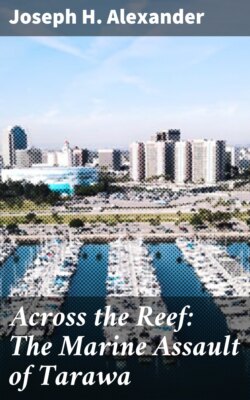Читать книгу Across the Reef: The Marine Assault of Tarawa - Joseph H. Alexander - Страница 8
На сайте Литреса книга снята с продажи.
Оглавление[Sidebar (page 5):]
Major General Julian C. Smith, USMC
Table of Contents
Department of Defense Photo (USMC) 70729
MajGen Julian C. Smith, USMC, right, commanding general, 2d Marine Division, escorts MajGen Holland M. Smith, USMC, commander, V Amphibious Corps, on Betio.
The epic battle of Tarawa was the pinnacle of Julian Smith’s life and career. Smith was 58 and had been a Marine Corps officer for 34 years at the time of Operation Galvanic. He was born in Elkton, Maryland, and graduated from the University of Delaware. Overseas service included expeditionary tours in Panama, Mexico, Haiti, Santo Domingo, Cuba, and Nicaragua. He graduated from the Naval War College in 1917 and, as did many other frustrated Marine officers, spent the duration of World War I in Quantico. As were shipmates Colonel Merritt A. Edson and Major Henry P. Crowe, Smith was a distinguished marksman and former rifle team coach. Command experience in the Fleet Marine Force (FMF) was limited. He commanded the 5th Marines in 1938, and he was commanding officer of the FMF Training School at New River until being ordered to the 2d Marine Division in May 1943.
Smith’s contemporaries had a high respect for him. Although unassuming and self-effacing, “there was nothing wrong with his fighting heart.” Lieutenant Colonel Ray Murray, one of his battalion commanders, described him as “a fine old gentleman of high moral fiber; you’d fight for him.” Smith’s troops perceived that their commanding general had a genuine love for them.
Julian Smith knew what to expect from the neap tides at Betio. “I’m an old railbird shooter up on the marshes of the Chesapeake Bay,” he said, “You push over the marshes at high tide, and when you have a neap tide, you can’t get over the marshes.” His landing boats were similarly restricted as they went in toward Tarawa.
Smith was awarded the Distinguished Service Medal for Tarawa to go with the Navy Cross he received for heroic acts in Nicaragua a decade earlier. The balance of his career was unremarkable. He retired as a lieutenant general in 1946, and he died in 1975, age 90. To the end of his life he valued his experience at Betio. As he communicated to the officers and men of the division after the battle: “It will always be a source of supreme satisfaction and pride to be able to say, ‘I was with the 2d Marine Division at Tarawa.’ ”
